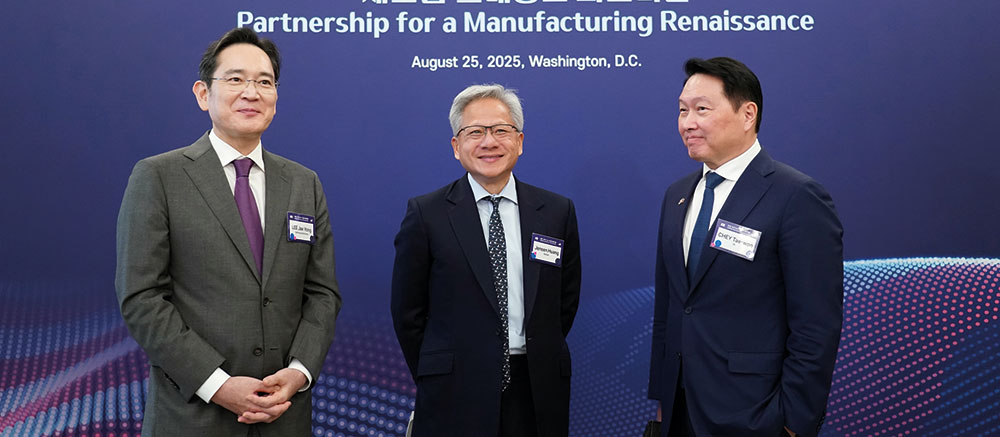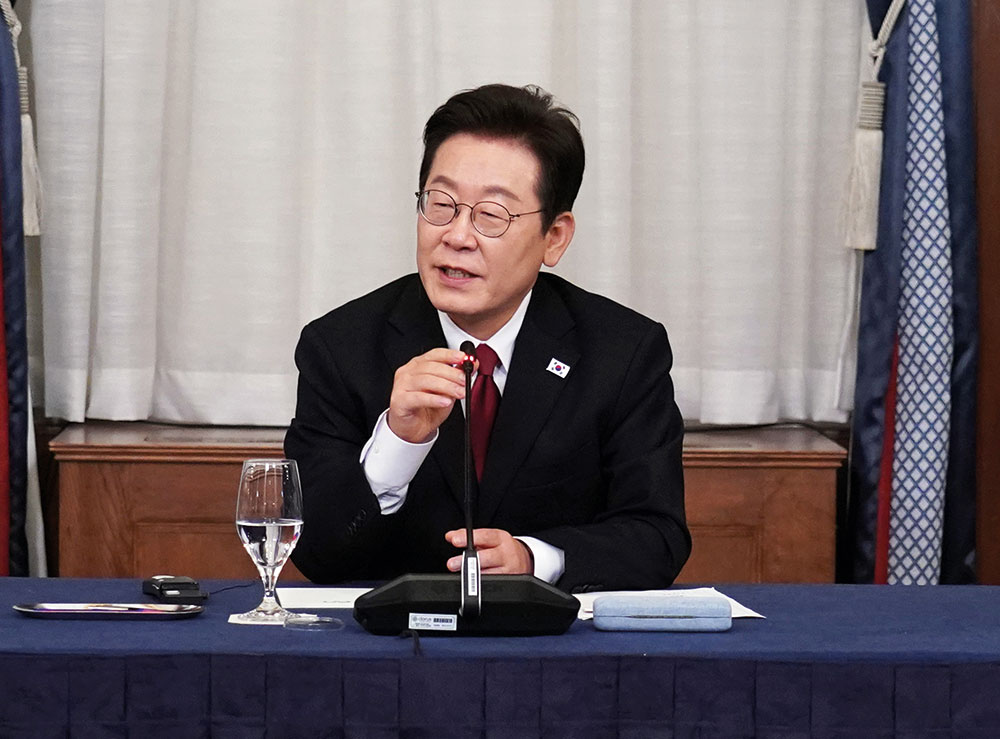The Korea–U.S. Tariff Agreement
A New Chapter in Korea–U.S. Cooperation
Toward a Manufacturing Renaissance
Following the recent resolution of tariff negotiations, a new dimension of economic cooperation has opened between Korea and the United States. In alignment with Lee Jae Myung’s first state visit to the United States, over 40 leading business and government figures from both nations gathered in Washington, D.C. The gathering marked the beginning of a renewed Korea–U.S. partnership aimed at revitalizing manufacturing industries.
Photographer Dong-yeol Kim
A Mammoth-Scale Business Roundtable of Leading Corporate Figures
On August 25 (local time), FKI hosted the “KORUS Business Roundtable – Partnership for a Manufacturing Renaissance” at the Willard Hotel in Washington, D.C.
President Lee was in attendance, and the event was joined by Korea’s Minister of Trade, Industry and Energy Jeong-kwan Kim and U.S. Secretary of Commerce Howard Lutnick.
On the Korean side, participants included FKI Chairman Jin Roy Ryu, along with Jae-yong Lee, Chairman of Samsung Electronics; Tae-won Chey, Chairman of SK Group; Eui-sun Chung, Chairman of Hyundai Motor Group; Kwang-mo Koo, Chairman of LG Group; Dong-kwan Kim, Vice Chairman of Hanwha Group; Ki-sun Chung, Executive Vice Chairman of HD Hyundai; Tae-soo Huh, Chairman of GS Group; Won-tae Cho, Chairman of Korean Air; Jay-hyun Lee, Chairman of CJ Group; Ja-eun Koo, Chairman of LS Group; Gee-won Park, Chairman of Doosan Enerbility; Jung-jin Seo, Chairman of Celltrion; Yun-birm Choi, Chairman of Korea Zinc; Sang-hyun Kim, Vice Chairman of Lotte Group; and Soo-yeon Choi, CEO of Naver.
The 21 representatives from the U.S. included Jensen Huang, CEO of NVIDIA, the global leader in AI semiconductors; David Rubenstein, Co-Chairman of the Carlyle Group, one of the world’s largest alternative investment firms; Gary Dickerson, CEO of Applied Materials, the global leader in semiconductor and display equipment; and Rainer Blair, CEO of Danaher, the global leader in life sciences research equipment.
Establishing a Strategic Bridgehead for the Korea–U.S. Manufacturing Renaissance Partnership
At the roundtable, participants engaged in in-depth discussions on strengthening cooperation between the Korean and U.S. business communities under the theme of "Partnership for a Manufacturing Renaissance," with a particular focus on advanced and strategic industries. There was broad consensus that Korea–U.S. cooperation has been a driving force behind both countries’ development. Discussions centered on three key agenda items: advanced industries, strategic industries, and the reinforcement of supply chains. Participants also addressed emerging energy issues in the AI era and the integration of AI in cutting-edge manufacturing. They explored new avenues for defense and space cooperation and shared ambitions for joint research and technology collaboration in the biotechnology sector.
Shipbuilding, identified as a core sector for collaboration, emerged as a key area where both countries reaffirmed their commitment to expanding cooperation. With the U.S. government positioning shipbuilding revitalization as a central policy initiative, Korea widely recognized as the world leader in shipbuilding capabilities is seen as an ideal partner. A range of collaborative initiatives will be pursued to advance the shipbuilding industries of both countries. Additional discussions included areas of energy transition and supply chain cooperation, such as Korea’s new administration-led “energy expressway” initiative and the securing of critical mineral resources. The roundtable also served as a forum for mutual counsel on improving the business environments in both Korea and the United States.
1. Advanced industries:
Semiconductors, AI, biotechnology, etc.
→ Enhancing global competitiveness
2. Strategic industries:
Shipbuilding, nuclear power, energy, defense, etc.
→ Securing future security
3. Supply chains:
Mobility, batteries, core materials, etc.
→ Building sustainable trade relations


“Korea and the United States aim to open a new chapter in the ‘Korea–U.S. Manufacturing Renaissance’ through this summit. Our two nations will work together not only in advanced industries such as AI,
semiconductors, and biotechnology but also in strategic sectors including shipbuilding and nuclear power.
We will share technologies and supply chains and cultivate future talent in partnership.
I hope today’s event marks the beginning of a golden era of mutual ascent and shared prosperity for Korea and the United States.”
- Jin Roy Ryu, Chairman of FKI
“The U.S. government is focused on ensuring that both nations secure stable supply chains, enhance the resilience of our industries, and strengthen our global competitiveness.
We also hope that Korea will increase its investment in the United States and that American innovators and citizens will be granted easier access to the Korean market.
I believe today’s meeting presents a valuable opportunity for growth and momentum.”
- Howard Lutnick, U.S. Secretary of Commerce

“I hope the Korea–U.S. Manufacturing Renaissance project becomes a critical turning point for the revitalization of American manufacturing, grounded in our solid alliance.
I also believe it will serve as a meaningful opportunity to further elevate Korea’s role and capabilities in global manufacturing.
Both I and the Korean government will provide steadfast support for the efforts of business leaders from both nations.”
- Lee Jae Myung, President of the Republic of Korea
Eleven Agreements and MOUs Signed
Immediately following the roundtable, a signing ceremony was held under the presence of Minister Jeong-kwan Kim and Secretary Howard Lutnick to strengthen the Korea–U.S. Manufacturing Renaissance Partnership. The event brought together approximately 60 corporate and institutional representatives from both countries, culminating in the signing of 11 agreements and memoranda of understanding (MOUs) across key sectors, including shipbuilding, nuclear power, aerospace, LNG, and critical minerals.
In particular, six MOUs were signed in strategic sectors such as shipbuilding and nuclear power, focusing on the establishment of joint funds, investments, and technological cooperation to expand bilateral collaboration. In the aerospace and LNG sectors, four agreements and MOUs were signed to support the stable operations of Korean companies. A supply chain sector MOU was also concluded to facilitate the export of key rare metals from Korea to the United States.
